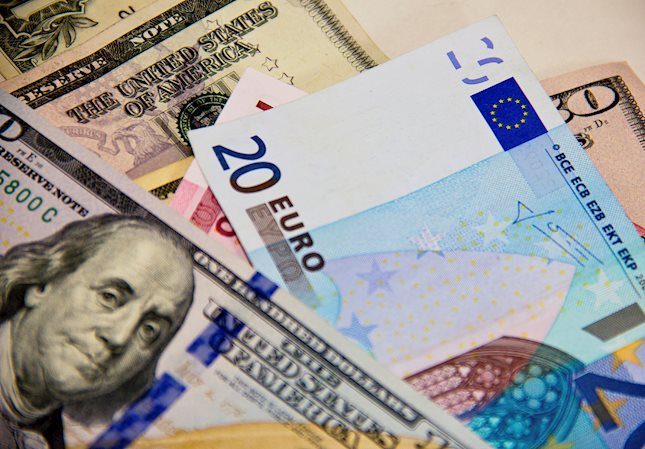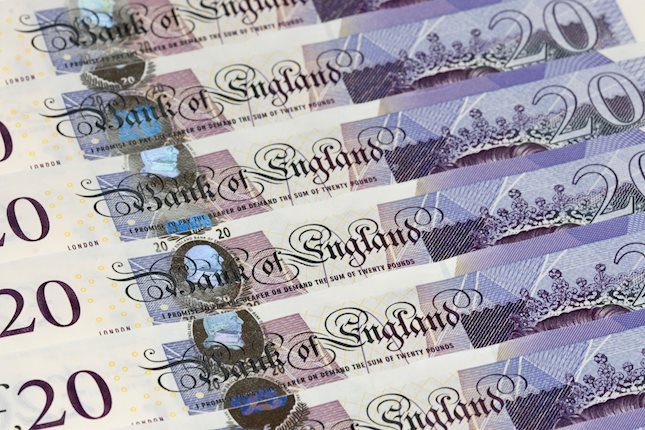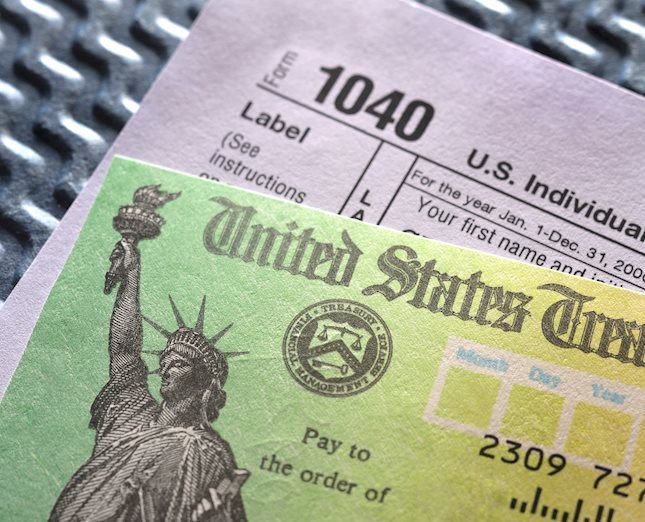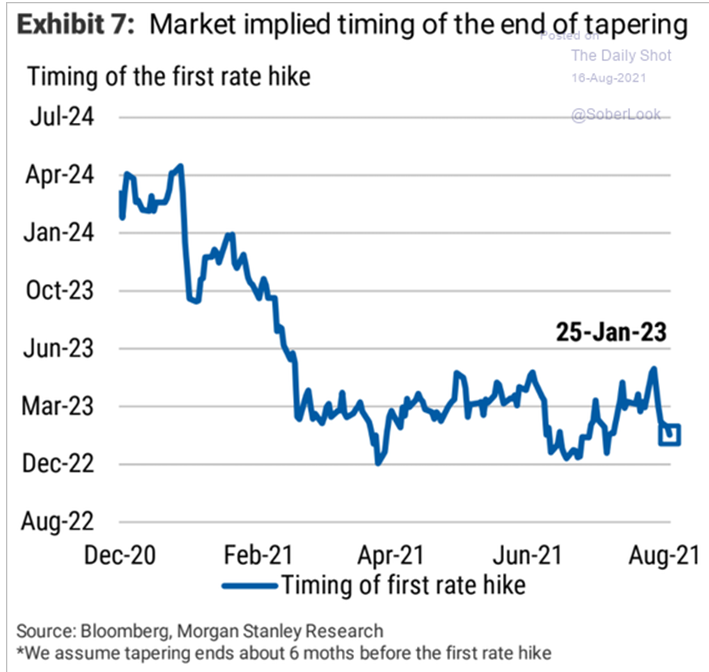Outlook: Risk-off arises from two bad US data releases in a row (consumer confidence, Empire state), from the Delta surge, from geopolitical worries, and from political unease in many countries (German election, Boris in general, US political divide along the mask/vax line). We can’t be sure risk-off will persist until the stock market says so. Yesterday most of Asia and Europe closed in the red, but not the US. Today is looking distinctly wobbly.
Is it possible that good data would reverse sentiment? We get industrial production today but retail sales will be the biggie. We know the American consumer is endlessly materialistic. But retail sales can be flighty. In June, sales rose 0.6% m/m, beating the forecast of 0.4% and reversing May’s drop by 1.7%. The July data was seriously impacted by special cases, like those auto sales. Trading Economics reports “Excluding automobiles, gasoline, building materials and food services, retail sales increased 1.1 percent last month after a 1.4 percent decrease in May.”
This time the consensus forecast is for -0.2% in July, with Treading Economics more pessimistic and forecasting -0.3%. But what if that nearly 1 million newly employed in July went out and shopped until they dropped? What if it’s a gain of 0.2% (or more) instead of a decline? Can one number change the mood? You bet.
Besides, retail sales is not the whole game. If disposable incomes went up, personal spending should go up, too, and not all of that shows up in retail sales. In June, personal consumption rose 1% m/m after a drop of -0.1% in May, more than forecast, in the giant shift to services, chiefly travel and restaurants. Alas, we don’t get that number until Aug 27–and by then, the only thing on our minds will be Jackson Hole.
Meanwhile, the idea of a good print on retail sales is a thin reed in a swamp of risk-off sentiment. New Zealand proved that point, with a single case trashing both bonds and the currency. The implications are far-reaching. Commodities are likely to slump, tracking oil, on an expected drop in global demand–and don’t forget those shipping/port charts from the FT yesterday. It looks like the dollar will continue “clawing back” some of its recent losses on the risk-off sentiment, even if the 10-year yield drop to 1.227% is a bit excessive and a kind of Delta Panic of its own.
Foreign Affairs: We haven’t read all the commentary about the US exiting Afghanistan in shameful disarray, but the departure is a good thing, economically. It’s a horrible thing for the citizens, especially women, of course, but the West can’t change a nation’s culture and social norms in two decades. One thing the previous president got right–the US is tired of stupid wars we could never win. Biden is also right–in what way is it in the US national interest to prop up a government that is both corrupt and incompetent, with a military that turns tail within hours?
The excuse used to be “We’re there so they don’t come here,” but that has worn pretty thin by now. Characters like Osama bin Laden don’t come along every day, and if the Taliban exports terrorism, there is no doubt the US/West will retaliate, and perhaps not “proportionately.” We can wish, however, for a more efficient and humane treatment of the Afghani refugees.
Economically, we wasted millions on a war in a country that has defeated empires. Forbes writes “the war in Afghanistan cost America $300 million per day for 20 years, or more than $2 trillion. That’s $50,000 for each of Afghanistan's 40 million people. And we borrowed that money. Forbes: “Brown University researchers estimate that more than $500 billion in interest has already been paid (included in the $2.26 trillion total sum), and they figure that by 2050 the cost of interest alone on our Afghan war debt could reach $6.5 trillion. That amounts to $20,000 for each and every U.S. citizen.”
That Afghanistan is still a horribly poor country is validation of the theft of the American largesse by the elite, including and especially the government elite that has now been able to afford to flee the country, while regular citizens mobbed the airfield to cling to planes.
And we are now haggling over whether we can afford trillions for infrastructure. It’s getting to be time to re-prioritize the place the Pentagon occupies. It can come first, it just has to be better managed and cost a whole lot less. Chances are okay that the US will not be going back to the Middle East. Unless China draws the US into something in the South China Sea, the US economy will benefit from the end of war. Just today, Reuters reports “China carried out assault drills near Taiwan on Tuesday, with warships and fighter jets exercising off the southwest and southeast of the island in what the country's armed forces said was a response to ‘external interference’ and ‘provocations’.” Is China trying to pick a fight?
And to press the issue, many of those soldiers about to be demobbed have many of the skills those US companies are seeking–logistics, communications, the ability to read and write. We are going to demob them, aren’t we?
This is an excerpt from “The Rockefeller Morning Briefing,” which is far larger (about 10 pages). The Briefing has been published every day for over 25 years and represents experienced analysis and insight. The report offers deep background and is not intended to guide FX trading. Rockefeller produces other reports (in spot and futures) for trading purposes.
To get a two-week trial of the full reports plus traders advice for only $3.95. Click here!
This morning FX briefing is an information service, not a trading system. All trade recommendations are included in the afternoon report.
Recommended Content
Editors’ Picks

EUR/USD clings to strong daily gains near 1.0400
EUR/USD remains on track to post strong gains despite retreating from the session high it set above 1.0430. The positive shift in risk mood, as reflected by the bullish action seen in Wall Street, forces the US Dollar to stay on the back foot and helps the pair hold its ground.

GBP/USD surges above 1.2500 as risk flows dominate
GBP/USD extends its recovery from the multi-month low it set in the previous week and trades above 1.2500. The improving market sentiment on easing concerns over Trump tariffs fuelling inflation makes it difficult for the US Dollar (USD) to find demand and allows the pair to stretch higher.

Gold price holds firm despite higher US Treasury yields
Gold prices remained flat at the beginning of the week even though the Greenback is getting battered. Higher United States Treasury bond yields kept the non-yielding metal pressured while US President-elect Donald Trump grabbed the headlines amid confusion on his tariff plans.

Ripple's XRP eyes massive rally following spike in key on-chain metric
Ripple's XRP trades near $2.40, up 1% on Monday following a 40% surge in its futures open interest. The surge could help the remittance-based token overcome the key resistance of a bullish pennant pattern.

Five fundamentals for the week: Nonfarm Payrolls to keep traders on edge in first full week of 2025 Premium
Did the US economy enjoy a strong finish to 2024? That is the question in the first full week of trading in 2025. The all-important NFP stand out, but a look at the Federal Reserve and the Chinese economy is also of interest.

Best Forex Brokers with Low Spreads
VERIFIED Low spreads are crucial for reducing trading costs. Explore top Forex brokers offering competitive spreads and high leverage. Compare options for EUR/USD, GBP/USD, USD/JPY, and Gold.
